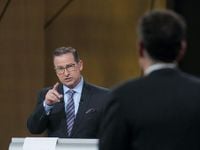MONT-LAURIER, Que. – The leader of the Bloc Québécois, Yves-François Blanchet, has ignited a political firestorm with his recent assertion that Canada is an "artificial country." His comments, made during a campaign stop in Shawinigan, Que., have drawn sharp criticism from political leaders across the spectrum, with many calling his remarks insulting to Canadians.
On April 24, 2025, Blanchet expressed his discomfort with the Canadian Parliament, stating, "I feel I am a member of a foreign parliament." Just a day later, he elaborated, declaring, "We are, whether we like it or not, part of an artificial country with very little meaning, called Canada." This sentiment has not only raised eyebrows but has also spurred a wave of backlash from various political figures.
Nova Scotia Premier Tim Houston was among the first to respond, expressing his dismay in a letter posted on social media. He described Blanchet’s comments as "insulting" and questioned the Bloc leader's commitment to Canada. "I find it difficult to find the words to adequately describe how insulting this statement is to all Canadians and to our great nation," Houston wrote. He further challenged Blanchet, asking, "What is it about Canada that you don’t like? You have been a politician since 2008, paid by Canadians; why haven’t you done your part to work towards improving this country we should all love so dearly?"
Blanchet’s remarks have prompted responses from other federal leaders as well. Prime Minister Mark Carney rejected Blanchet's comments outright, asserting, "This is an incredible country. I’m incredibly proud to be Canadian." Carney emphasized Canada’s rich history and the accomplishments of its people, stating that those who question the nation’s legitimacy are mistaken.
Conservative Leader Pierre Poilievre also condemned Blanchet's remarks, labeling them "insulting and false." He added, "Canada is a strong, proud and sovereign country with a rich history. As Prime Minister, I will always defend Canada and make it stronger than ever before." Meanwhile, NDP Leader Jagmeet Singh warned that such comments could weaken Canada, particularly at a time when external threats loom large, referencing attacks from the United States. "We’ve got Donald Trump attacking us. We don’t need attacks from the inside like that," Singh stated, emphasizing the need for unity.
Despite the criticism, Blanchet stood firm in his position during a campaign stop on April 26, 2025. He reiterated that his comments were not meant as an insult but rather an observation about Canada’s political structure. "It isn’t meant as an insult. Daily politics in Canada shows that," he stated, arguing that Canada is a collection of regions with differing issues, and that Ottawa is attempting to centralize power instead of respecting regional identities.
In his defense, Blanchet referenced former Prime Minister Justin Trudeau’s 2015 statement in a New York Times interview, where Trudeau described Canada as the "first post-national state." Blanchet argued that Quebec, in contrast, is a proud nation deserving of recognition and respect, and he suggested that the federal government often disregards this identity.
Blanchet’s history as a politician is notable; he has been a member of the Bloc Québécois since 2019 and previously served in Quebec's National Assembly. His advocacy for Quebec sovereignty is well-documented, and his latest comments align with this long-standing position. However, in the current political climate, where external pressures from figures like President Trump threaten Canada’s sovereignty, many view Blanchet’s remarks as divisive.
Political analysts suggest that Blanchet’s comments may resonate with some voters in Quebec who feel marginalized within the broader Canadian context. Yet, the backlash he faces from other provinces highlights the ongoing tensions between Quebec separatism and Canadian nationalism.
As the federal election approaches, the implications of Blanchet's comments could have significant repercussions for the Bloc Québécois, which has historically positioned itself as a champion of Quebec's interests. Polls indicate that the party may lose ground in the upcoming election, but it could still play a crucial role in a minority government scenario.
In a political environment increasingly defined by polarization, Blanchet’s assertion that Canada is an "artificial country" has opened a Pandora's box of national identity discussions. His remarks have not only sparked outrage but have also forced Canadians to confront the complexities of their national identity in an era marked by external threats and internal divisions.
As the situation unfolds, it remains to be seen how these comments will affect public sentiment and the political landscape in Canada. With leaders from various parties firmly rejecting Blanchet's narrative, the discourse surrounding national identity and unity is likely to continue dominating the political conversation leading up to the election.





